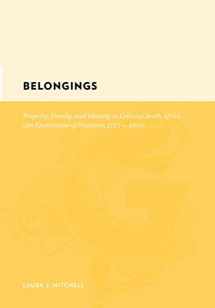
Belongings: The Fight for Land and Food (Gutenberg-e)
ISBN-13:
9780231142526
ISBN-10:
0231142528
Edition:
1
Author:
Sally Miller
Publication date:
2008
Publisher:
Columbia University Press
Format:
Hardcover
252 pages
FREE US shipping
on ALL non-marketplace orders
Marketplace
from $35.48
USD
Marketplace offers
Seller
Condition
Note
Seller
Condition
Used - Good
Good condition with reasonable wear. May include limited notes and/or highlighting.
Book details
ISBN-13:
9780231142526
ISBN-10:
0231142528
Edition:
1
Author:
Sally Miller
Publication date:
2008
Publisher:
Columbia University Press
Format:
Hardcover
252 pages
Summary
Belongings: The Fight for Land and Food (Gutenberg-e) (ISBN-13: 9780231142526 and ISBN-10: 0231142528), written by authors
Sally Miller, was published by Columbia University Press in 2008.
With an overall rating of 3.7 stars, it's a notable title among other
South Africa
(African History, Southern Africa, Historical Study & Educational Resources, World History) books. You can easily purchase or rent Belongings: The Fight for Land and Food (Gutenberg-e) (Hardcover) from BooksRun,
along with many other new and used
South Africa
books
and textbooks.
And, if you're looking to sell your copy, our current buyback offer is $0.3.
Description
Laura J. Mitchell concentrates on the contested dynamics of land tenure in the Cedarberg region of the Western Cape, from the first settler land claim of 1725 to the entrenchment of colonial administration in the 1830s. Based on a decade of research, Mitchell focuses on the conflict between Dutch East India Company officials, settlers, indigenous Khoisan, and Indian-Ocean slaves, detailing the ways in which settlers themselves—rather than Company policy or an imperial army—drew the frontier into a colonial orbit and then gradually placed it under colonial control. Against a backdrop of often violent resistance, settlers claimed land one farm at a time. Family by family, household by household, the inhabitants of the Cedarberg region were bound to each other and to a colonial society based at Cape Town. The Khoisan resisted displacement, the appropriation of their livestock and hunting grounds, involuntary servitude, and subordination. Likewise, settlers resisted the Dutch East India Company's efforts at controlling territorial expansion, limiting their interaction with independent Khoisan groups, and regulating bonded labor. At the same time, the increasing presence of European material culture in frontier spaces proved that many settlers still affirmed their relationship to colonial power. Mitchell enriches her social history with insights from anthropology, archaeology, sociology, and environmental and women's studies, considering multiple sources of power and identity and recovering the role of women in creating settler society.


We would LOVE it if you could help us and other readers by reviewing the book
Book review

Congratulations! We have received your book review.
{user}
{createdAt}
by {truncated_author}


